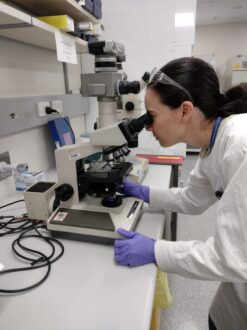Dr Eva Baxter grew up in the Netherlands and never imagined she would live and work in Australia or become a leading researcher in endometrial cancer. But she always had a passion for science and a sense of adventure.
“I thought about studying medicine, but I wasn’t satisfied with the idea of knowing about a disease or which drug could treat it. I wanted to understand how and why it worked,” Eva said.
Eva studied biomedical sciences at the University of Southampton in the United Kingdom and then completed a PhD at the University of Edinburgh. By coincidence, her colleague in Edinburgh knew someone in Brisbane recruiting PhD candidates, so she sent her CV. Before she knew it, Eva found herself in Australia.
After researching at the QIMR Berghofer Medical Research Institute for several years, Eva started a part-time role on a three-month contract for the Queensland Centre for Gynaecological Cancer Research (QCGC Research). In 2018, the QCGC Research team didn’t have a laboratory. To analyse tissue samples, Eva borrowed space from another research group.
“Endometrial cancer is under-researched, and I found this work very interesting,” Eva said.

In 2022, QCGC Research became Eva’s focus. For four days a week, she coordinated and analysed the samples collected from women who participated in the feMMe trial, continuing to borrow lab space when needed. In 2023, with further support from Cherish, QCGC Research recruited its second postdoc, Dr Zoe West, and established a dedicated laboratory at The University of Queensland’s Centre for Clinical Research.
Today, Eva’s time is dedicated to feMMe Molecular, the project that evolved from feMMe.
“In feMMe, we found that 50 per cent of women responded well to the non-surgical treatment, but we could not predict who would benefit. The goal of feMMe Molecular is to analyse the blood and tumour samples from feMMe to determine which women will respond and which will not.
“Ultimately, we want to reach a point where if you’re diagnosed with endometrial cancer, you can do a blood test or a biopsy, and the doctors can offer you this treatment if you’re likely to benefit from it or advise you to opt for surgery,” Eva said.
While she blames her husband for keeping her in Brisbane, Eva has also found a research team she respects and a sense of purpose in her work. She is aiming for the sky now.
“Molecular analysis is now part of all our clinical trials. Collecting blood and tumour samples will become a norm because it offers data that we could use to personalise a woman’s treatment.”

Cherish proudly funds QCGC Research’s first post-doctoral researcher – Dr Eva Baxter.
“Without Cherish, QCGC Research wouldn’t have started down this pathway. Cherish keeps us grounded and connected to people who will benefit from our research. I think Cherish will always be needed and valued. Without Cherish’s support to kickstart small trials, we couldn’t secure the funding for big projects,” Eva said.
Cherish partnered with QCGC Research and other industry stakeholders, like Sullivan Nicolaides Pathology and Metro North Hospital and Health Service, to support the team’s successful application for a National Health and Medical Research Council Partnership Grant for feMMe Molecular.
Cherish funded the early studies for feMMe Molecular. With Cherish’s support, Eva gathered and analysed eight samples. This was enough preliminary evidence to show funding bodies that QCGC Research had the samples and could conduct the analysis.
“We tried to secure national funding several times. It was only when we had everything lined up, including our partnership with Cherish, that we were successful. It will take seven years to get from the research idea to the end of the feMMe Molecular project. And this project builds on 10 years of existing research (feMMe).”

The FeMMe Molecular project aims to determine which women benefit from the non-surgical treatment and which will not.
First, the team had to retrieve the blood and tumour samples from the individual sites across Australia and New Zealand where volunteers had participated in the feMMe trial. Then, they gathered initial data from these samples so that they could apply for further research funding.
The team has now generated almost all of the data from the samples. The next phase is for a statistician to analyse the data and identify what factors in a woman’s blood and/or tumour indicate that she will respond to the treatment.
Once the team has identified the molecular factors (or biomarkers), they will share this information with the study partners in the United States. These partners will validate what QCGC Research has found.
The final step is to run a pilot study at the Royal Brisbane and Women’s Hospital to assess if clinical teams can take and analyse the samples in real time to impact a woman’s treatment options.
“I feel we are on the right track. But working with international partners will allow us to test our findings in different medical settings,” Eva said.
If you would like to support Eva’s research, please donate today. Through generous community Cherish can continue to fund her position.

The first trial Eva worked on for QCGC Research was feMMe, the precursor to the feMMe Molecular project. During an earlier trial investigating the benefits of laparoscopic surgery for endometrial cancer, the research team found that larger women did not fare well. This discovery led them to initiate the feMMe trial, with initial funding support from Cherish.
feMMe aimed to treat women with endometrial cancer less invasively using the Mirena, an intra-uterine device (IUD), weight loss, and an anti-diabetes drug, Metformin. The research team recruited 165 women for the trial over seven years, with the last participant enrolled in November 2019. And feMMe evolved into a new study – feMMe Molecular.